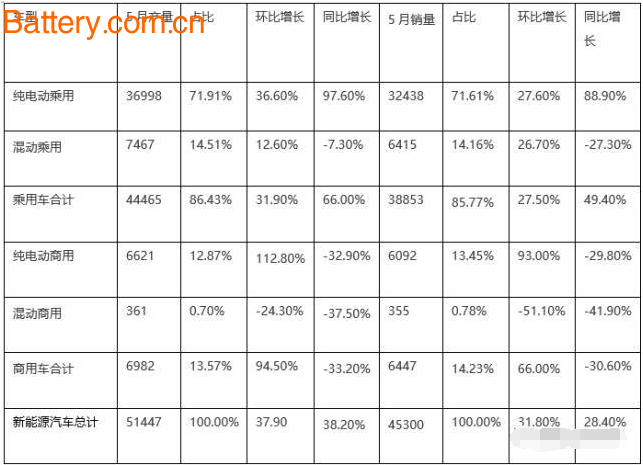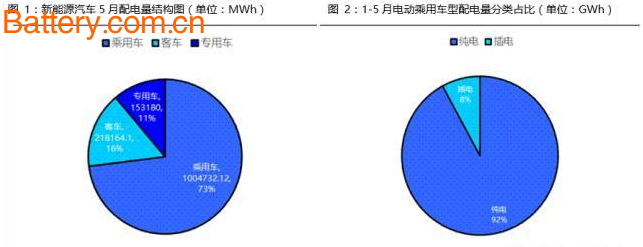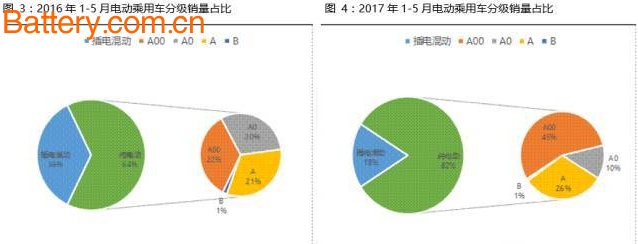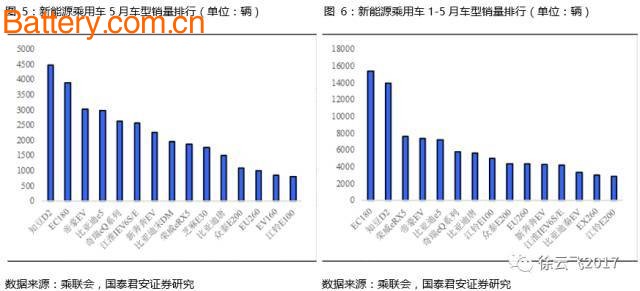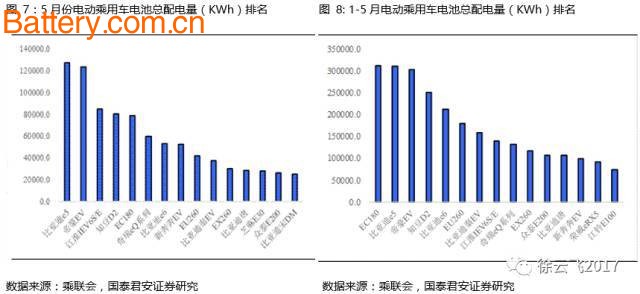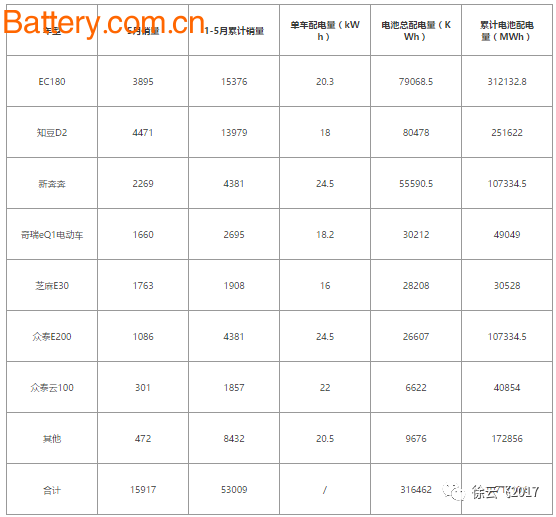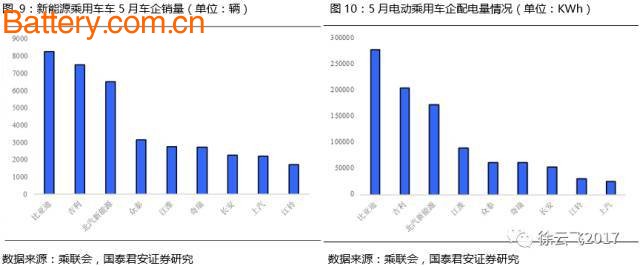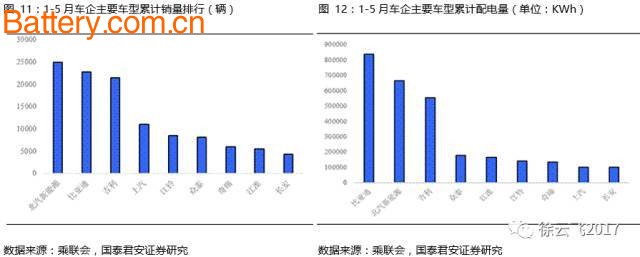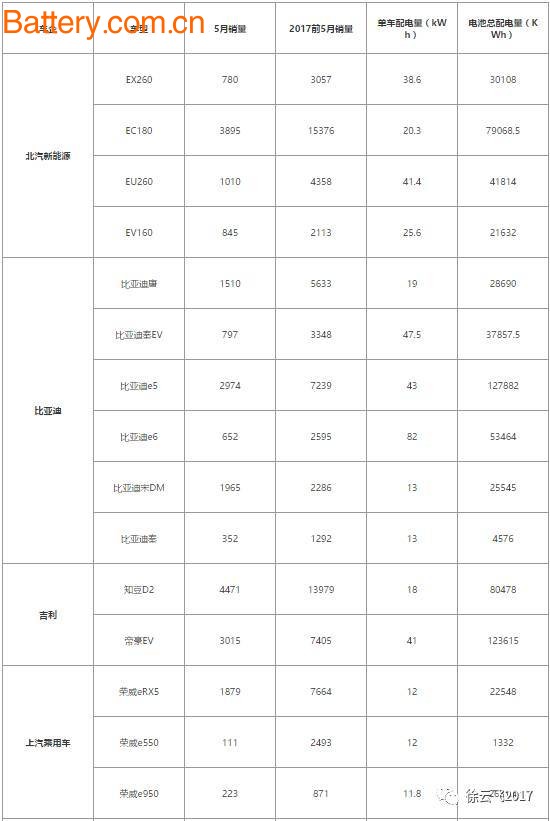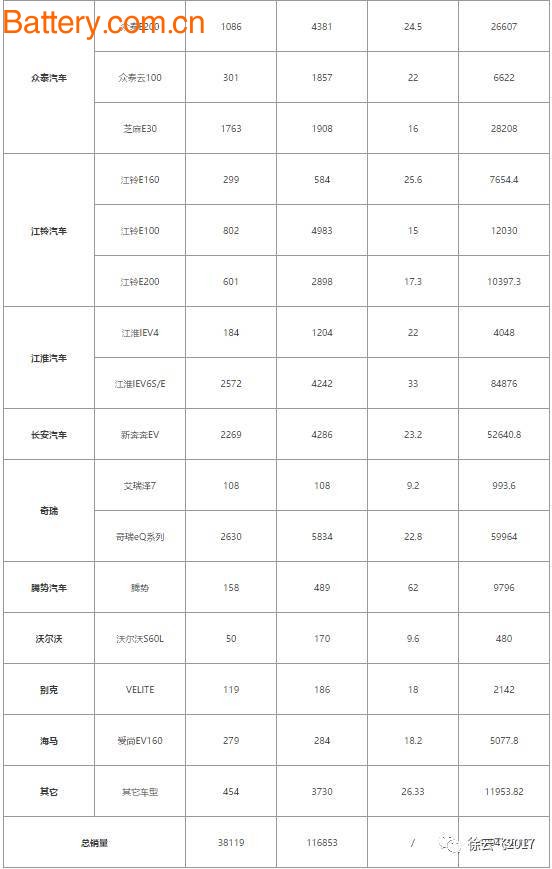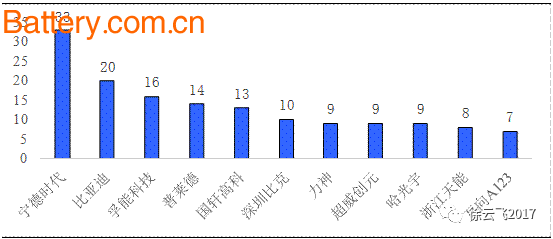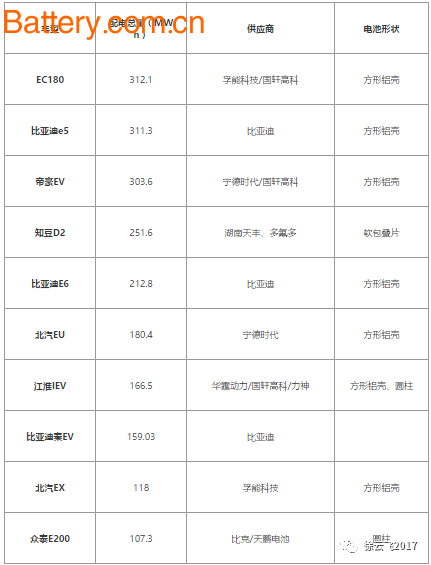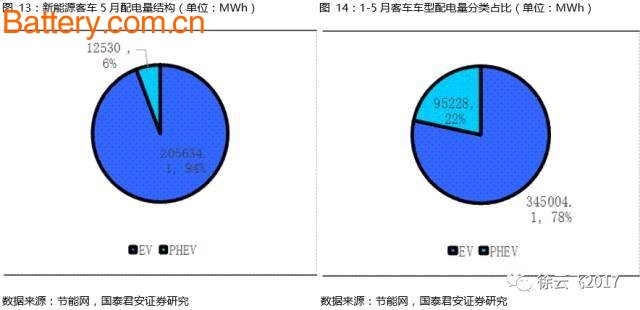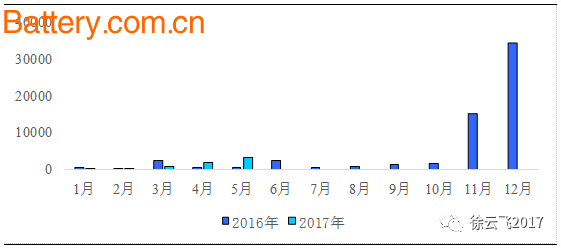Based on the disclosed sales data of new energy vehicles in May 2017, we analyzed the actual distribution of power distribution in May and January 2017 by closely sorting the sales volume and distribution of various vehicle models. The actual structure of the battery matching market. 1. New energy vehicles resumed production and sales in May According to the data of the China Automobile Association, the production and sales volume of new energy vehicles reached 51,447 and 45,300 respectively, up 38.2% and 28.4% respectively. In May 2017, sales of new energy passenger vehicles reached 38,853 units (accounting for 85.8% of new energy vehicle sales), up 49.4% year-on-year and 27.5% quarter-on-quarter, continuing the rapid increase. Among them, pure electric passenger cars are still the main force of heavy volume, achieving sales of 32,438, an increase of 27.6% from the previous month, an increase of 88.9%, accounting for 71.6% of the sales of new energy passenger vehicles in the same period. Hybrid passenger car sales were only 6415 units, up 26.7% from the previous month and down 27.3% year-on-year, accounting for 14.2% of new energy passenger car sales during the same period. Commercial vehicles were greatly affected by policy adjustments in the early stage. The production and sales of passenger cars in the first four months were suppressed. In May, sales of 6,447 vehicles were achieved, down 30.6% year-on-year and 66% quarter-on-quarter. Energy-saving network data shows that new energy in May 2017 Passenger cars sold 1973 vehicles, down 76% year-on-year. In May, the sales volume of pure electric vehicles was 3,330 units, a year-on-year increase of 557%. With the sufficient number of the first five batches of passenger car catalogues, the passenger car industry adjustment and local promotion will enter the volume window. Table 1: Comparison of production and sales of new energy vehicles in May 2. The total power distribution of power battery in May increased strongly, and passenger cars are still the main force. In May, the total distribution capacity was 1376.1MWh, and the distribution of passenger vehicles accounted for 73% of the total. According to the calculation of new energy vehicle production and sales in May 2017, the power battery distribution in May totaled 1376.1MWh, up 42.1% from the previous month. Among them, passenger car sales in May reached 38,100 units, and the distribution capacity was 1004.7MWh. The proportion of up to 73% has become the absolute main power distribution (the distribution of pure electric passenger cars and plug-in hybrid passenger cars is 917.6MWh and 87.1MWh respectively, accounting for 91% and 9% respectively). The electricity consumption is 218.16MWh, accounting for 16%; the special vehicle distribution capacity is 153.18MWh, accounting for 11%. The passenger car is only 59% of the sales volume of the special car, but the bus car has a much higher power than the special car, so the actual power distribution of the bus is higher than the special car. From the overall performance of the chain in May, the distribution of passenger vehicles increased by 28% from the previous month, matching the sales growth rate. According to the cumulative sales volume of passenger cars in January-May (the cumulative sales volume of passenger cars is 116,800, and the average power distribution is 25.79KWh), we calculate the corresponding power battery distribution totaling 3.01GWh, of which pure electric passenger cars are equipped. The power consumption is 2.75GWh, accounting for 92%, which is 2% higher than that of the previous month. The power distribution of plug-in hybrid passenger vehicles is 0.26GWh, accounting for only 8%, which is 2% lower than the previous month. . 3, electric passenger car - the trend of miniaturization is obvious, the return of the BYD king 3.1 Model structure: miniaturization trend appears, A00 mainstream status is stable From the perspective of model sales, the A00 is the main model for passenger cars. In May 2017, the total sales volume of new energy passenger vehicles was 38,100, which was 45% higher than the 263,000 vehicles in the same period of last year. Among them, A00 accounted for 42% of the total sales volume of passenger vehicles, a slight decrease of 4 percentage points from the previous month. However, by comparing the sales structure of January-May 2016 and January-May 2017, it can be seen that a large number of new energy passenger vehicles are small-sized cities such as A00. The sales ratio of plug-in hybrid passenger cars is shrinking. The proportion of PHEV sales in the first five months of this year dropped from 36% last year to 18%. Due to the imperfect industrial layout and slow development of China's plug-in, the first-tier cities are all pure electric. Mainly; the proportion of A00 models in pure electric vehicles has increased from 22% last year to 45%, and the sales ratio has significantly expanded. From the sales situation of the models, the two models of the A00 are the top runners in monthly sales. In the Top10 model sales in May, the A00 sedan accounted for 5 models, with a total sales volume of 15,000 units, accounting for 54.8% of the top 10 sales. Among them, BAIC EC180 and Zhidou D2 won the championship and the championship with 3895 and 4471 respectively. Among the top 20 major models, the faster growth rate in May was Changan Benben (273%), Beiqi EU series (175%), Beiqi EV (78%), Jianghuai IEV series (36.6%), Chery. Eq series (26.2%); BYD Qin EV (305%), Emgrand EV (202%), BYD e5 (167%), Zotye E200 (37%). In the total sales volume from January to May, BAIC EC180 and Zhidou D2 also ranked first and second (15376, 13979), and Chery eQ series ranked sixth with 5,834 units. Roewe eRX5 (7664), Dorsett EV (7405), and BYD e5 (7239) occupy the top five positions with 7000-volume sales. In terms of vehicle power distribution, the A00 model's May distribution accounted for 31.5% of the total, which was lower than the sales volume (42%). Due to the average power distribution of the A00 model bicycle 20.5kwh, which is lower than the average power distribution capacity of the passenger car 26.33kwh, its power distribution is only 316.46WMh, which only accounts for 31.5% of the passenger car's power distribution, driving the power battery growth capacity. More limited. Among the distribution in May, the top three BYD e5 (127.9MWh), Dorsett EV (123.6MWh) and Jianghuai IEV6S/E (84.9MWh) were B, A and A0. Among the cumulative total distribution in January-May, the A00 model EC180 (312.13MWh) and the Zhidou D2 (251.62MWh), relying on leading sales to increase the total distribution, respectively ranked 1st in the power distribution list. Fourth, in addition to the top ten models such as BYD e5 (311.28 MWh), Dorsett EV (303.61 MWh), etc. accounted for 73.5% of all power distribution. Table 2: Distribution of A00 electric passenger vehicle (unit: kWh) 3.2 Cars and Enterprises: The first echelon is stabilized, and the BYD King returns. BYD ranked first in sales and distribution of vehicles in May. Judging from the sales of the main models of the car companies, BYD (8,250 vehicles) returned to the first throne in May, Geely ranked behind (7,486), and Beiqi New Energy ranked third (6530). Geely's sales of EVs with its A00 Chezhidou D2 and A-type cars are steadily increasing; Beiqi New Energy is mainly pure electric vehicles , covering the new energy passenger vehicle market in Beijing and Tianjin; and BYD's small plug-in passenger car sales It accounted for more than 40% of the total sales of electric vehicles. In May, it returned to the position of sales first with the outbreak of Song DM. Due to the popularity of the A00 models, Zhongtai, Jianghuai, Chery, Changan, SAIC and other car companies have also entered the second echelon of the passenger car market with their fist products. In terms of power distribution, BYD, Geely, and Beiqi have the same ranking of sales and sales, but BYD still relies on a variety of high-capacity vehicles, and its power distribution is the second gap. It is estimated that the distribution of the three components is 278MWh, 204.1MWh and 172.6MWh from high to low. Its total sales volume accounted for 58.4%, and the total power distribution accounted for about 65.2%. From the cumulative sales and distribution of January-May, the ranking of passenger car companies is fixed. The top three companies in terms of sales volume are Beiqi New Energy (24,904), BYD (22,809) and Geely (21,472); the top three in terms of distribution are BYD (836.6MWh) and Beiqi New Energy (664.6) MWh), Geely (555.2MWh). The three constitute the first echelon of new energy passenger cars, compared with the fourth-ranked car companies, both in terms of distribution and sales have far widened the gap. The following are detailed car and model data: Table 3: Summary of power distribution of electric passenger car enterprises in May 3.3 Supply Chain: Deep integration trend, high battery supplier concentration From the 2017 1-5 batch of new energy passenger car promotion catalog battery support situation, the mainstream battery suppliers are CATL, BYD, Fueng Technology, Pride, Guoxuan Hi-Tech, etc., of which CATL has a large number of 33 models. Leading peers, BYD's 20 models are ranked second, and Fueng Technology (16), Pride (14) and Guoxuan Hi-Tech (13) are also in the top five. Figure 13: 1-5 batches of new energy passenger car promotion catalog battery support situation (unit: section) From the high-quality models with the highest total power distribution in January-May, the mainstream battery suppliers are still: lithium battery leading manufacturers such as BYD, CATL, Guoxuan Hi-Tech, and Feneng Technology, which are also consistent with the battery supporting situation. In addition to the BYD power battery all supply its own models, other lithium battery brands in the same model application cross, such as CATL and Guoxuan are involved in supporting the Emgrand EV, and Guoxuan Hi-Tech and Fueng Technology are in the BAIC EC180. In addition, large battery suppliers have deepened the cooperation of downstream OEMs with close cooperation through joint ventures and other forms of cooperation. High-quality hot-selling models have high volume expectations and product life expectancy in the future, which is expected to drive the concentration of battery suppliers to increase steadily. Table 4: Distribution of suppliers of best-selling passenger cars in 2017 (as of May 2017) 4, electric bus: May distribution accounted for 16%, is about to enter the heavy volume period According to the energy-saving network data, in May 2017, the sales volume of new energy buses was 1973, down 76% year-on-year and 66% quarter-on-quarter, of which 1,623 were pure electric buses, down 79% year-on-year and 259.1% quarter-on-quarter; , a year-on-year decrease of 42% and a decrease of 52% from the previous month. For example, the average power distribution of pure electric buses is 126.7KWh, and the average distribution of power distribution of passenger cars is 35.8KWh. In May 2017, the distribution of passenger cars reached 218.16MWh, accounting for 16% of the total power distribution of new energy vehicles . From the point of view of the distribution of the subdivided vehicles, the distribution of pure electric buses is 205.63 MWh, and the distribution of mixed buses is 12.53 MWh, accounting for 94% and 6% respectively. According to the energy-saving net data, we have accumulated 5,393 electric passenger cars (including 10 fuel-powered vehicles) in the first five months, and the corresponding total battery capacity is 440.23MWh, including 2,723 pure electric buses and 2,660 hybrid buses. It is 345.00MWh and 95.23MWh, respectively, and the corresponding proportion is 78% and 22%. Commercial vehicles were greatly affected by policy adjustments in the early stage. The production and sales of passenger cars in the first four months were suppressed, and the current industry has been adjusted. With the sufficient number of the first five batches of passenger car catalogues, the adjustment of the bus industry and local promotion will simultaneously enter the heavy-duty period. It is expected that the passenger volume from June to July will be more objective. 5, electric special vehicles: May distribution accounted for 11%, sales growth will continue According to the energy-saving network data, in May 2017, the sales volume of new energy special vehicles (all pure electric power) was 3,330 units, a year-on-year increase of 557%, a year-on-year increase of 69%. It was estimated that the special vehicle field in May 2017 had a distribution capacity of 153.18MWh. , accounting for 11% of the total energy distribution of new energy vehicles. According to the statistics of energy-saving nets, the cumulative sales of electric special vehicles in January-May was 6,582 vehicles, a year-on-year increase of 55%. If the average value of bicycle power distribution is 46KWh, the corresponding total battery capacity is 302.77MWh. At present, the number of models in the first five batches of catalogues is large, and the subsidy scheme of 30,000 kilometers of net transmission may be subject to downward adjustment. The real demand of the superimposed logistics service enterprises is released, and it is expected to continue the growth of the sales of electric special vehicles. power. Figure 15: Special vehicles in May have entered the volume window Brother Compatible Label,Thermal Label Printer Brother,Brother Compatible Labels,Brother Ql 500 Compatible Labels Jiangmen Hengyuan Label Technology Co., Ltd , https://www.jmhylabelprinted.com